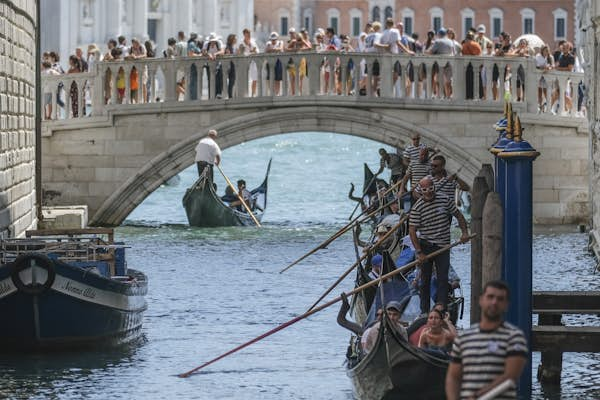Venice introduces new tourist rules for 2024, including an entry fee and limits on tour groups
In an effort to regulate the number of tourists within the city, Venice is introducing a new booking system for visitors.

In an attempt to tackle mass tourism, Venice, Italy, has announced a slew of new tourist rules for 2024, including a limit to tour group sizes and the trial of a €5 fee to enter the city for day-trippers.
This expanded package of measures is designed to manage visitor influx more effectively and help preserve the city's unique heritage. This comes after UNESCO said last August that it would consider adding Venice to its list of world heritage sites at risk, highlighting the pressing need for comprehensive preservation efforts from officials.
From June 1, the Venice City Council will limit walking tours to a maximum of 25 people per group, bringing them into line with the maximum size of tour groups in Venice's museums. Tour groups will also be banned from stopping on bridges or in narrow streets and passageways. The city has also prohibited the use of loudspeakers.
Alongside Barcelona and Amsterdam, Venice is one of the poster destinations for overtourism and its struggles with huge numbers of visitors have been well documented. Still, travelers continue to pour in at a rate that surpasses the capacity of its delicate, centuries-old infrastructure. In 2019, the city welcomed a staggering 30 million visitors, many of whom stayed for just one day.
Speaking to local media, Mayor Luigi Brugnaro has described the new entry fee as a “first-of-its-kind experiment.” He said the goal is, “to create a more livable city,” but UNESCO has also warned of “irreversible changes” to the city and lagoon, and “continuing deterioration due to human intervention, the impacts of climate change and mass tourism.”
It said that Italy has not done enough to preserve the area, citing a “lack of significant progress in addressing the complex issues.”
Here's everything you need to know about Venice's new tourist rules for 2024.
Tourists are returning to Venice © Claudio Stocco/ShutterstockWhat is the city tax in Venice 2024?
Venice is set to introduce a €5 entry fee for day visitors from April 25, 2024, in a bid to combat overtourism. The entry fee must be paid by everyone over 14 years old.
When does the Venice entry fee come into effect?
Day trippers will need to pay an entry fee on days in 2024. This is during the first peak tourism period of 2024 (April 25 to May 5), each weekend in May and June, plus the first two weekends of July.
The day-tripper entry fee will only apply during peak hours from 8:30am to 4pm. Those arriving later for dinner or a concert won't have to pay.
One of Venice's most iconic landmarks opens to visitors for the first time in 500 years
Who has to pay to enter Venice?
All day-trippers over the age of 14 must pay the fee. Those staying overnight in Venice accommodation will not have to pay but will still need to register via the new system.
Residents of Venice and the wider Veneto region (and their relatives) will not have to pay an entry fee. People with disabilities, students enrolled to study in the city, and those visiting the city for the day for health reasons or a sporting event or concert are also exempt.
Do I need to register to enter Venice?
Yes. All visitors, including day-trippers, will need to pre-book their visit through an online booking platform that launches on January 16.
Even those exempt from paying the day-tripper fee will have to register to enter Venice. That includes people who are staying in accommodation in the city.
Upon booking, visitors will receive a QR code that they can then scan at electric turnstiles located at Venice's main access points, including the main train station, to gain access to the city. Officials say they will also check people's QR codes at random.
Authorities say this new system will allow them to have a better understanding of how many people will be coming and going and prepare accordingly. The idea is that they will be able to apply more resources in areas like waste management and traffic control on busy days.
UNESCO threatened to blacklist Venice if it didn't take issues related to climate change and mass tourism seriously © Getty ImagesVenice's other measures to manage overtourism
The entrance fee is another cog in an ambitious and heavily monitored system that tracks the comings and goings of people in Venice. In 2022, the council installed a network of cameras, sensors, and mobile phone data in the city to keep track of visitor numbers and information.
The purpose of this tracking system is to identify areas where crowds are gathering and temporarily restrict access until the congestion eases, diverting people elsewhere so as not to block pedestrian traffic. Officials say the tracking system gives them a clearer picture of the number of people passing through and allows them to predict when specific areas will get busy. They insist it's done with “absolute respect for privacy.”
Furthermore, as a response to warnings from UNESCO about the damage caused by cruise ships, Venice officially banned such ships from the historic city center last April. Instead, large ships are now redirected to alternative ports like Fusina and Lombardia, alleviating the pressure on Venice's infrastructure.
Is Venice restricting tourists?
No, the Venice City Council has previously said that they won't limit the number of visitors. Instead, they plan to raise the entry fee on days when visitor numbers reach a certain threshold. However, they have never revealed any details of what that threshold number is.
Are there any rules in Venice?
Yes. Venice has implemented various rules designed to maintain its cleanliness and heritage. These are enforced by the Venice City Council Municipal Police. Violators face penalties ranging from a €25 to €500 fine or, in some cases, a ban from the city. These rules include the following:
-
Do not consume food or drink on St Mark's Square, unless at a bar or restaurant.
-
Always walk on the right.
-
Do not stop on any bridges.
-
Bicycles are banned (even if pushed by hand).
-
Only book tours with qualified tourist guides.
-
Never buy goods from illegal vendors.
-
Picnics are only allowed in public gardens on this map.
-
Do not walk around in swimwear.
-
Swimming and divining are both banned.
-
Do not litter or do graffiti.
-
Love locks (and all other types of padlocks) are prohibited.
-
Do not feed the pigeons.

















